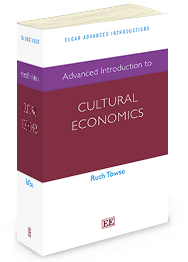
Ruth Towse, Advanced Introduction to Cultural Economics (Edward Elgar Publishing: 2014)
Description
‘Ruth Towse presents a fabulous, broad ranging overview of cultural economics. The book is up to the state of knowledge, is easy to read and reveals sound judgment. I highly recommend the book to anyone concerned about the relationship of culture to society – as everyone should!’
– Bruno S. Frey, University of Zurich, Switzerland and Zeppelin University, Germany
Elgar Advanced Introductions are stimulating and thoughtful introductions to major fields in the social sciences and law, expertly written by some of the world’s leading scholars. Designed to be accessible yet rigorous, they offer concise and lucid surveys of the substantive and policy issues associated with discrete subject areas.
Written by an internationally renowned expert in the field, Professor Ruth Towse, this book presents a comprehensive yet concise introduction to cultural economics. She covers a broad range of topics in the arts and cultural industries, using the tools of economics to explain their supply and demand, production and consumption.
Starting from the 1960s concern about costs and public finance in the performing arts, the subject has developed over the last fifty years to include museums and built heritage, and lately, the wider creative industries and their issues with copyright. This book explains the theoretical underpinnings and reports on the main empirical research on the creative industries, cultural policy, performing arts, heritage, artists’ labour markets, copyright, broadcasting, film and music, festivals, cities of culture, creative clusters and economic impact.
Contents
Contents: 1. About Cultural Economics 2. Cultural Economics and Cultural Policy 3. Performing Arts 4. Museums and Built Heritage 5. Artists, the Art Market and Artists’ Labour Markets 6. The Creative Economy 7. Copyright 8. Broadcasting Music and Film Industries 9. Festivals, Cities of Culture, Creative Clusters and Economic Impact 10. Conclusion Index
‘Ruth Towse has provided an indispensable guide and companion for anyone seeking an informed grasp of the economics of the cultural sector. In a series of wonderfully clear and well-organized chapters on themes including the creative economy, cultural policy, artists’ labour markets and copyright, and characterized throughout by insightful references to key theories, players and institutions, this book skillfully lays out and explains the fundamental and distinctive economic features of artistic and cultural industries. A valuable resource and timely contribution to the thinking of an emerging generation of researchers and scholars.’
– Gillian Doyle, University of Glasgow, UK
‘Ruth Towse presents a fabulous, broad ranging overview of cultural economics. The book explores the forefront of knowledge, is easy to read and reveals sound judgement. I highly recommend the book to anyone concerned about the relationship of culture to society – as everyone should!’
– Bruno S. Frey, University of Zurich, Switzerland and Zeppelin University, Germany
Elgar Advanced Introductions are stimulating and thoughtful introductions to major fields in the social sciences and law, expertly written by some of the world’s leading scholars. Designed to be accessible yet rigorous, they offer concise and lucid surveys of the substantive and policy issues associated with discrete subject areas.
Written by an internationally renowned expert in the field, Professor Ruth Towse, this book presents a comprehensive yet concise introduction to cultural economics. It covers a broad range of topics in the arts and cultural industries, using the tools of economics to explain their supply and demand, production and consumption.
Starting from the 1960s concern about costs and public finance in the performing arts, the subject has developed over the last fifty years to include museums and built heritage, and lately, the wider creative industries and their issues with copyright. This book explains the theoretical underpinnings and reports on the main empirical research on the creative industries, cultural policy, performing arts, heritage, artists’ labour markets, copyright, broadcasting, film and music, festivals, cities of culture, creative clusters and economic impact.
Key features include:
• a unique survey of the main developments in the field
• written in straightforward language including explanations of all technical terms
• each chapter offers guidance for further reading for those who wish to pursue the subject beyond an introductory level
• accessible to anyone with an interest in what drives the creative economy and how the arts are financed.
Composed in a succinct and engaging style, this commanding introduction will prove an essential resource for students of business economics and industrial organisation, particularly those with an interest in culture, the arts and the media.
>>Order the book here





